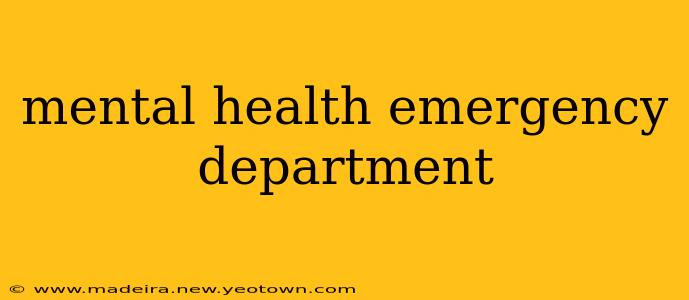The flashing lights, the sterile smell, the hurried whispers – a trip to the emergency department (ED) is rarely pleasant. But when a mental health crisis strikes, the ED might be your lifeline. This isn't a place you'd typically choose for help, but understanding how it works can be incredibly empowering during a difficult time. This guide will walk you through what to expect, addressing common concerns and questions.
What is a Mental Health Emergency?
A mental health emergency is any situation where your mental state poses an immediate risk to yourself or others. This isn't just feeling down; it's about experiencing intense distress that feels overwhelming and uncontrollable. Think suicidal thoughts, severe anxiety attacks causing panic, psychotic breaks with loss of touch with reality, or self-harm behaviors. The key is the immediacy of the danger. If you're struggling but not feeling actively suicidal or harming yourself, other options like therapy or outpatient treatment might be more appropriate.
When Should I Go to the ED for a Mental Health Crisis?
This is a crucial question, and the answer depends on the severity of your situation. If you are experiencing:
- Suicidal thoughts or plans: This is a critical situation requiring immediate professional attention. Don't hesitate – go to the ED immediately.
- Homicidal thoughts or urges: If you're having thoughts of harming others, seek help at once. The ED is equipped to handle such situations safely.
- Severe anxiety or panic attacks that are not responding to usual coping mechanisms: Overwhelming anxiety that is preventing you from functioning normally warrants immediate medical evaluation.
- Psychotic episodes (hallucinations or delusions): Experiencing things that aren't real or holding strongly held false beliefs that are significantly impacting your life requires professional help.
- Self-harm behaviors: If you've engaged in self-harm or are having strong urges to do so, seeking immediate help is crucial.
- Severe depression leading to functional impairment: If you're unable to care for yourself or meet basic needs due to severe depression, ED intervention is advisable.
What Happens When I Go to the ED for a Mental Health Issue?
The experience can vary depending on the hospital, but here’s a general overview:
- Triaging: You'll be assessed by a nurse or doctor to determine the urgency of your situation. This initial assessment is key to determining the level of care you need.
- Assessment: A mental health professional, such as a psychiatrist or psychologist, will conduct a thorough assessment of your symptoms and history.
- Treatment: Depending on your needs, you might receive medication, therapy, or both. Sometimes, you'll be admitted to an inpatient psychiatric unit for more intensive treatment. Other times, you'll receive a plan for outpatient care.
- Discharge planning: If you're not admitted, you'll receive a plan outlining steps for continued care, including referrals to therapists, support groups, or other resources.
What Kind of Treatment Can I Expect in a Mental Health ED?
Treatment options vary greatly, but commonly include:
- Medication: Medication can help stabilize mood, reduce anxiety, or manage psychotic symptoms.
- Crisis intervention: Trained professionals will help you manage your immediate crisis and develop coping strategies.
- Referral to other services: You'll likely be referred to therapists, support groups, and other services for ongoing care.
- Safety planning: Creating a plan to help you stay safe during and after your crisis is a vital part of treatment.
Are Mental Health EDs Different From Regular EDs?
While some hospitals have dedicated mental health EDs, many integrate mental health services into their general EDs. Regardless, expect to encounter a team with experience in managing mental health crises. The environment might be similar to a regular ED, but staff receive specific training to handle the unique challenges of mental health emergencies.
Will My Insurance Cover Mental Health Treatment at the ED?
Most insurance plans cover at least some aspects of mental health treatment in the ED, but the extent of coverage varies. It's crucial to check your policy's specifics regarding mental health services and out-of-network providers.
What if I Don't Have Insurance?
Many EDs offer financial assistance programs or work with community organizations to ensure individuals can access necessary care. Don't let a lack of insurance prevent you from seeking help if you're in crisis. Inquire about financial assistance options upon arrival.
Remember, seeking help during a mental health crisis is a sign of strength, not weakness. Reaching out for support is a crucial step towards recovery. If you or someone you know is experiencing a mental health emergency, don't hesitate to contact emergency services or go to the nearest ED immediately.

